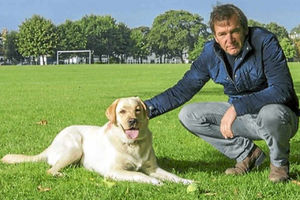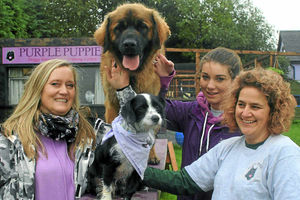Doggy daycare leading the way in Shropshire
A mother standing on the roadside waving off her child on the school bus is a common scene, but what if it isn't her child being collected . . . but her dog?
They call it 'doggy daycare', and this latest phenomenon to be imported from America is slowly spreading across the UK.
With all household members increasingly out working in a bid to bring in as much to the pot as possible, more poor pooches are being left home alone, with many whimpering away.

A recent Channel 4 TV programme used secret filming to show how many dogs suffer distressing separation anxiety, when their owners leave them behind.
Dog trainer and behaviour specialist, Deb Gallimore of Pennerley, near Shrewsbury, launched her own dog day care business in September when her fourth child began school. She has researched the practice across the UK and Ireland.
Her new business, Purple Puppies, is based in the grounds of her smallholding.
With a bus collection service, custom-built indoor and outdoor areas including a trampoline to rest on, agility equipment, treats for good behaviour, constant supervision, stimulating hide and seek board games and even a canine "sausage-dispenser" treadmill, her "guests" definitely get more than just walkies and a pat on the head.
Having help from Sophie Jones, an apprentice from Reaseheath College near Whitchurch, Deb, who has 20 years experience behind her, is geared up to meet this fast-evolving need.
Visiting on a recent wet and windy day, a trial session was being run for nine-year-old English springer spaniel, Bracken, from Craven Arms.
After arriving with her owner, Deb wanted to see how she would get on with fellow classmates Patchy, a Jack Russell cavalier and miniature Yorkshire terrier mix and Clementine the leonberger, one of Deb's own four dogs.
Wagging her tail and coming over to give me a sniffy hello, the new girl looked happy enough, mixing in quite well.
One of the first things Bracken did was enjoy a walk with her new friends. "It's like meeting people for coffee," says Deb. Deb's elderly rottweiler Holly is also one of the first characters new boys and girls are introduced to as she is "a wonderful quieter".
"This isn't suitable for all dogs," explains Deb. "Some dogs don't like close proximity to other dogs. That's why we have trial days. It's like the first day at school. It's nerve-wracking for them."
Deb had asked Bracken's "mum" what was her dog's favourite thing to do? What she liked and disliked? Did she have any issues with guarding?

"The main thing is that all the dogs have a good experience, that is a nice one," says Deb. Facilities include an area that the dogs can roam about in; sand they can dig in, gravel which they are encouraged to use as a loo – it's all about encouraging them to use their natural behaviour in an appropriate way. The canine treadmill is used to give extra exercise and to build confidence. "The dogs enjoy it," adds Deb. "They see it as a sausage-dispenser."
Deb and Sophie use food rewards all the time. "We need them to associate them with good things.
"They are rewarded for looking at us; for giving us their attention. We're not here to train the dogs. We're here to look after them and make sure they're safe."
Deb can arrange training sessions if required at other times. She already runs workshops for dog owners and their pets and is considering running a Saturday social for people to visit, enjoy a coffee and see if doggy day care could be for them.
So why did she decide to branch out into day care? "It is going to grow in popularity," Deb explains.
"The people I have already spoken to have already seen their businesses grow slowly. It's big news in America. I think everything, including dogs in prams and dogs in designer clothes, they all started in America."
Although more dogs are being left home alone, Deb acknowledges that not all of them get stressed.
"Dogs are sociable. That's why they're our companion animals. It's about how they are allowed to get used to being alone, and for it not to be a scary thing.
"Often people have a week or two off when they get their dog and then all of a sudden have to go back to work and it's quite a culture shock at that point."
Some people try to prepare their dogs by practising the routine of putting on their shoes to leave and saying, "I'm going now, there's your basket".
"If they were human they could understand you but they're not and they can't," she says.
One solution, Deb suggests, is the use of rest cages with the doors open, which can be used at home to let our loyal companions know that being alone is fine.
"You can make it like a den and they can learn it is a safe place. Some people make the mistake of never letting the dog be alone at all."
When the dog is comfortable with their den, which can be a cage, crate or indoor kennel, she says it's a good idea to start by leaving them alone in it for five minutes while you go into another room.
"You can put a nice dog treat in there. What you should never do is lock the cage. That makes it a nasty place.
"But you can't buy a crate the one day and leave the dog alone the next for eight hours. That's far too long to be alone."




